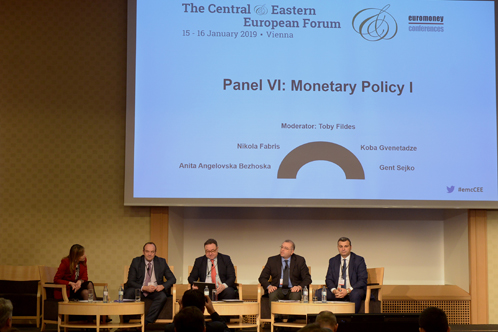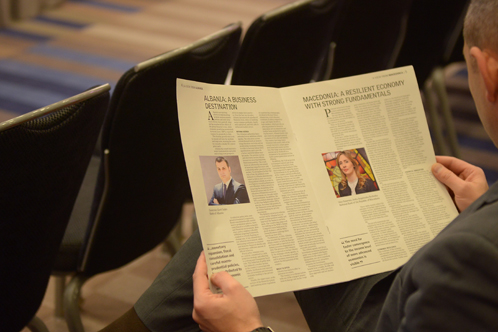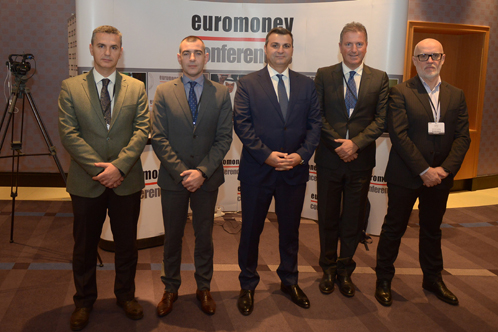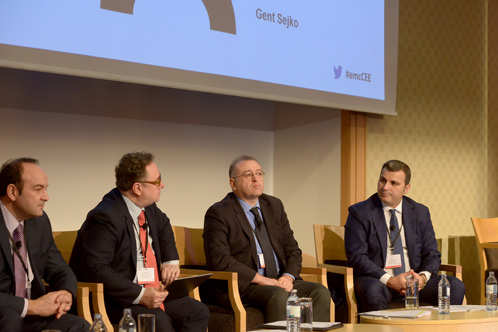BANK OF ALBANIA
PRESS RELEASE
Governor Sejko attends the Central and Eastern European Forum organised by Euromoney
Publication date: 16.01.2019
The Central and Eastern European Forum (CEE) was held on 15-16 January 2019, in Vienna, Austria. It is an annual Euromoney event that brings together renowned figures of politics, economy and finance from CEE countries.

The Forum was organised in the form of panels with specific topics, where attendees were invited to discuss on the latest economic developments in European and global economies.
The panel of central bank governors from CEE countries on monetary policy was of particular importance. In this panel, attended also by the Governor of the Bank of Albania, were present as well: The Governor of the National Bank of the Republic of Macedonia, Ms Anita Angelovska Bezhoska, the Deputy Governor of the Central Bank of Montenegro, Mr Nikola Fabris, the Governor of the National Bank of Georgia, Mr Koba Gvenetadze.

The panel’s discussion focused on important topics related with the economies of CEE countries, and in particular: the expected impact of the end of the quantitative easing undertaken by the European Central Bank; the divergence of the cycles of the major global economies; the performance of inflation in the countries of the region; the prospects of the exchange rate market; structural changes in payment systems; the role of banks in monetary policy, etc.
Governor Sejko presented an overview of the Albanian economic and financial situation. He stressed that Albania is experiencing a stable cyclical recovery, recording accelerated growth over the last three years and bringing the domestic economy closer to equilibrium.

Also, the Governor said that the ECB's monetary policy stance has a strong and direct impact on the economies and financial systems of the region, as a result of the geographic proximity of markets, financial integration, and stronger cyclical convergence. From this perspective, the accommodative monetary policy stance implemented by the Bank of Albania has been in line with the current accommodative monetary policy in the euro area. He added that the tightening of monetary conditions in the euro area is expected to occur roughly in parallel with the reduction of the monetary stimulus in Albania.

The Governor added that Albania will not have strong adverse effects from the ending of the monetary easing programme of the ECB. Moreover, Albania has received foreign direct investments in Albania, on energy production and natural resources, so this would not lead to a capital flight or debt stress. He added that the exposure of the Albanian private sector to the debt markets is minimal, as the Albanian business is largely financed through private funds or through the domestic banking sector.
Subsequently, the discussion continued with regard to the monetary policy pursued by the Federal Reserve, the appreciation of the US dollar against the euro in global foreign exchange markets. The policy tightening, according to the Governor, would not directly affect Albania, except for the usual negative effects on fuel prices and raw materials.
The Governor also underlined the importance of continuing the efforts for a faster integration of Western Balkan countries into the European Union, in order to accelerate the pace of economic growth, enhance social welfare, and better anchor the country's long-term prospects.
During this two-day Forum, Governor Sejko held meetings with prominent international personalities, senior officials of central banks, as well as representatives of various commercial banks.

 Linkedin
Linkedin
 Twitter
Twitter
 Youtube
Youtube
 Facebook
Facebook
 Flickr
Flickr
 RSS
RSS
 Subscribe
Subscribe
 Feedback
Feedback